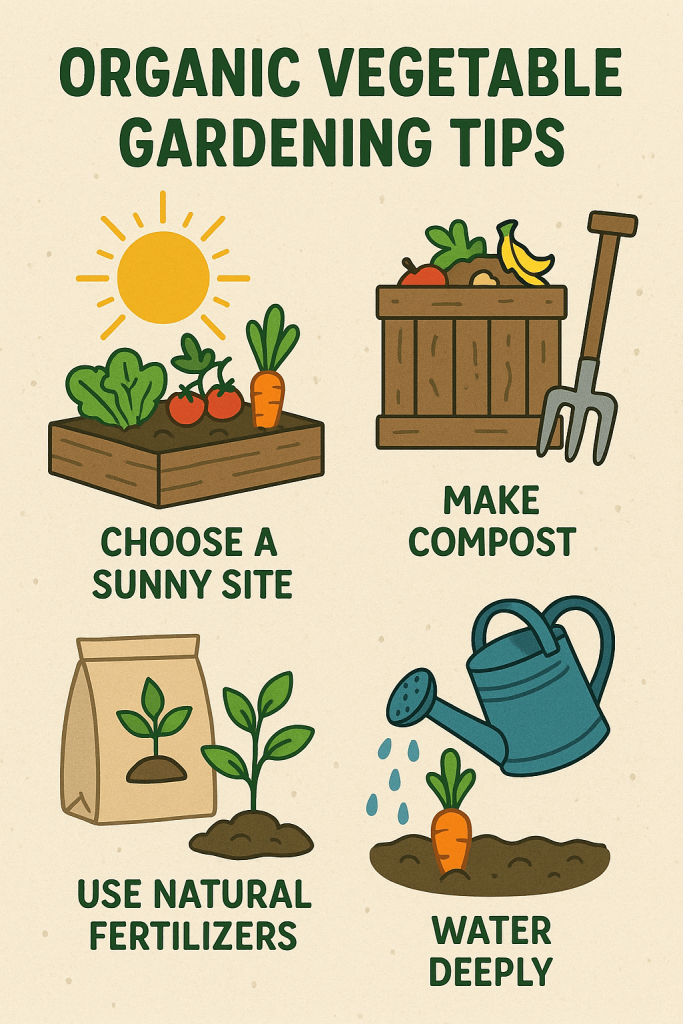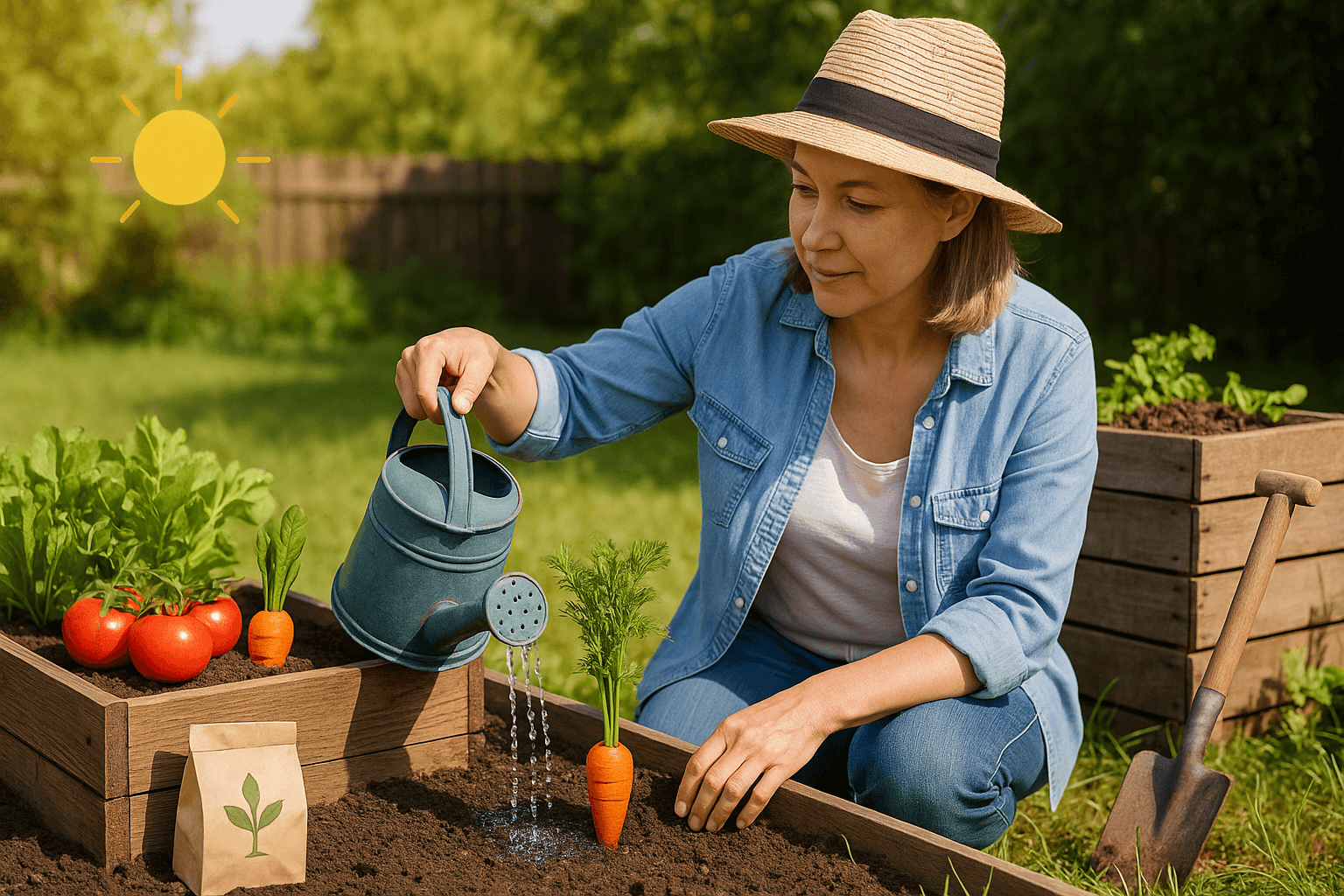Organic vegetable gardening means growing food the natural way. No chemicals. No fake fertilizers. Just real soil, real seeds, and a little care. It’s about working with nature, not against it.
So why go organic? First, it’s better for your health. You know exactly what’s going into your food, because you put it there. No pesticides. No weird sprays. Just clean, fresh veggies straight from your garden. It’s also good for the planet.
Organic gardens help the soil stay rich and full of life. They protect bees, butterflies, and other helpful bugs. Plus, you use less plastic and packaging because you’re not buying store-bought produce.
Even better, It just tastes amazing. Home-grown tomatoes, carrots, or leafy greens have more flavor. They’re picked fresh, not shipped across the country or stored for weeks.
Organic gardening also saves money in the long run. Seeds are cheap. Compost is free if you make your own. And your grocery bill goes down when your garden starts producing.
Also Read: Top Non-Profit Organizations in The World Who Work to Save The Environment
And let’s be honest, it feels good. Growing your own food is fun, relaxing, and satisfying. You get your hands in the dirt, spend time outdoors, and enjoy real results. Whether you’ve got a big backyard or just a few pots on a balcony, anyone can grow organic. It’s not about being perfect. It’s about starting small and growing something real.
Pick the Right Spot and Soil
Your garden’s success starts with the right spot and healthy soil. You don’t need a huge yard—just the right conditions to help your vegetables thrive.
Choose a Sunny Location
Most vegetables love the sun. Try to pick a spot that gets at least 6 to 8 hours of direct sunlight every day. Leafy greens like spinach and lettuce can handle a little shade, but tomatoes, peppers, cucumbers, and beans need full sun to grow well and produce lots of food.
If you’re working with limited space, like a balcony or patio, don’t worry. Containers or raised beds in sunny areas work just fine.
Make Sure It Drains Well
Your plants don’t like wet feet. Avoid spots where water collects or stays soggy after rain. If the soil holds water, your veggies might rot or grow poorly. You can improve drainage by building raised beds or adding organic material like compost to loosen up heavy soil.
Start with Healthy, Organic Soil
Good soil is full of life. That means worms, microbes, and nutrients your plants need. Don’t use soil that’s been treated with chemicals. Instead, buy organic potting mix or make your own by mixing garden soil with compost, aged manure, or leaf mold.
If you’re serious, test your soil pH. Most veggies like a pH between 6.0 and 7.0. You can buy simple test kits online or at garden centers.
Feed the Soil, Not Just the Plant
In organic gardening, soil health is everything. Add compost regularly. Mulch with straw, shredded leaves, or grass clippings to keep the moisture in and the weeds out. Over time, your soil will get better and better—and so will your harvest.
Starting with good soil saves you time, effort, and disappointment. Get this step right, and your garden will thank you.
Start with Easy Vegetables
If you’re new to gardening, don’t try to grow everything at once. Start small. Choose a few vegetables that are easy to grow, don’t need a lot of care, and give you quick results. This keeps it fun and helps you stay motivated.
Best Beginner-Friendly Veggies
Here are some great choices for first-time gardeners:
- Tomatoes – They love the sun and grow well in pots or beds. Cherry tomatoes are especially easy.
- Lettuce – Grows fast and doesn’t need deep soil. Great for cooler months.
- Radishes – Super quick to grow—sometimes ready in just 25 days!
- Carrots – They like loose, sandy soil. Just make sure the soil is deep enough for roots.
- Beans – Bush beans are easy to manage, and pole beans grow tall and give big harvests.
- Zucchini – One plant can produce loads. Just give it space and sunshine.
- Spinach – Grows in cooler weather and doesn’t mind a bit of shade.
Grow What You Eat
Don’t plant things just because they sound cool. Think about what your family actually likes to eat. There’s no point growing eggplant if nobody at home wants to eat it.
Know Your Growing Zone
Check your USDA Hardiness Zone or your country’s planting calendar. It tells you what to plant and when, based on your local climate. Some veggies do better in spring, others in fall.
Start with Seeds or Seedlings?
Seeds are cheaper but take more time. Seedlings (small starter plants) are easier and faster. If you’re new, you might want to mix both.
Pick a few easy veggies, give them love, and watch them grow. Success with these will give you the confidence to try more later.
Keep It Natural – No Chemicals
One of the best parts of organic gardening? You don’t need harsh chemicals to grow great vegetables. Nature already gives you what you need—you just have to use it right.
Feed with Compost and Natural Fertilizers
Skip the chemical fertilizers. Instead, feed your garden with compost, worm castings, or aged manure. These are packed with nutrients and safe for your plants, your family, and the environment.
Compost adds life to the soil. It helps roots grow strong and holds in moisture. You can buy compost, or better yet—make your own using kitchen scraps, dry leaves, and garden waste.
Worm compost (also called vermicompost) is another great option. Worms break down waste into super-rich plant food.
Fight Pests the Natural Way
Bugs happen. But don’t panic and spray chemicals. There are safer, organic ways to protect your plants.
Try neem oil, a natural spray that keeps away many harmful insects. Or use garlic and chili spray, it’s easy to make at home and works well on soft-bodied pests.
You can also grow certain plants together to help each other. This is called companion planting. For example, basil helps protect tomatoes from pests. Marigolds keep bugs away from most vegetables.
Welcome the Good Bugs
Not all bugs are bad! Ladybugs, bees, and lacewings help your garden by eating harmful pests or pollinating your plants. Avoid sprays that harm them.
Rotate Crops and Mix Things Up
Don’t plant the same vegetable in the same spot every year. Change things up. This keeps the soil healthy and reduces diseases. Also, mixing different crops in one bed (called interplanting) helps prevent pests from spreading.
By keeping your garden natural, you’re creating a healthy space that supports life—not just for your veggies, but for everything around them.

Watering, Weeding, and Patience
Once your garden is planted, it’s time for daily care. Watering, weeding, and waiting—all part of the process. Organic gardening takes time, but it’s worth it.
Water the Right Way
Plants need water, but not too much. The trick is to water deep, not often. This means soaking the soil so the roots grow down strong, rather than staying shallow. Aim to water in the early morning—it keeps leaves dry, reduces disease, and lets plants soak up water before the sun gets hot.
Use a watering can, hose with a spray head, or a drip system. For small gardens, even a recycled jug with holes works fine.
Mulch to Stop Weeds and Keep Moisture
Mulching is a game-changer. Spread a layer of straw, dried leaves, or wood chips around your plants. It keeps weeds down, locks in moisture, and makes your garden look neat.
It also protects the soil from drying out or washing away during heavy rain.
Pull Weeds Often
Weeds steal water and nutrients from your veggies. Pull them out early, before they get big. It’s easier when the soil is damp. Even just 10 minutes a day makes a difference.
Be Patient and Keep Learning
Gardening takes time. Seeds don’t sprout overnight. Sometimes plants fail. That’s okay. Every mistake teaches you something.
Celebrate the wins. Share your harvest. Take pictures. Your garden is a living thing, and it grows with your care.
Stick with it. With patience and love, your organic garden will feed your body, and your soul.
